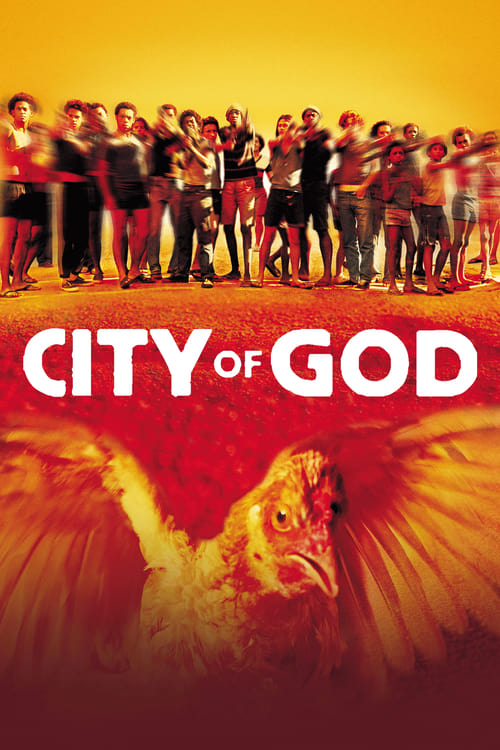
City of God
Released: 2002-08-30
In the poverty-stricken favelas of Rio de Janeiro in the 1970s, two young men choose different paths. Rocket is a budding photographer who documents the increasing drug-related violence of his neighborhood, while José “Zé” Pequeno is an ambitious drug dealer diving into a dangerous life of crime.
Drama
Crime
8.4 / 7419
Duration: 129 min.
Budget: $3.3M
Revenue: $30.6M
Trailer
Gallery
Reviews

Crazypiglady
Rating:/10
It’s a great film and well worthy of its the respect it has. It’s gruelling too, the 18 rating is due to the thread running through the film of continuous and ruthless violence of gangs trying to control their drug area. The is the story told through the eyes of ‘Rocket’ who avoids getting in to the gang war of his brother and friends by trying to find a safer life. The film combines slick production without losing a genuine documentary feel which I think it is why it’s so enduring. While it achieves a feeling of reality, it isn’t specifically a true story. However, the Cidade de Deus is real (being created to rehouse the slums away from Rio de Janeiro) and this story of its underworld and the film’s production makes one believe it may not be too far from the truth. There is hope in the story but not a lot.

CinemaSerf
Rating:7/10
Told by way of an occasionally narrated retrospective, "Rocket" (Alexandre Rodrigues) tells us a story of his childhood in the outskirts of Rio de Janeiro. Growing up in a community of newly built boxes, without power or plumbing, that reminded me of a row of concrete beach huts, the community is pretty lawless. The crime is largely to confined to pettier crimes, but as aspirations grow so does the scale of the criminality. A raid on a motel-cum-brothel is supposed to make everyone extra cash, but their inventive young watchman "Li'l Dice" (Douglas Silva) hates being left out and so does a little augmenting of his own. Brutal and attention grabbing. Next the cops crack down, bodies pile up and the societal order starts to change. It's this young man who grows up into the leading drug-peddling hoodlum amongst a now much more developed township where, tempered only by his more diplomatic childhood friend "Bené" (Phellipe Haagensen), the newly named "Li'l Zé" (Leandro Firmino) is ruling the roost. Curiously, his own form of government proves more stable for the residents, and although many are addicts there is a certain degree of law-and-order. Then the runts start to intervene. These are the young children with no hope, no families and only the dream of becoming their own version of "Li'l Zé" one day too. Gradually, the empire expands until it's only "Carrot" (Matheus Nachtergaele) who stands against him. When tragedy strikes very close to home for the kingpin, though, the uneasy peace between the two sections breaks out into an open warfare that drags in the sharpshooting army vet "Knockout Ned" (Seu Jorge), arms all the enthusiastic children and creates an environment that isn't safe for anyone - and where the police keep their distance in the hope that they will just all just slaughter each other. It's lucky that "Rocket" can use a camera. His boss wants publicity to illustrate how dominant and powerful he is. The newspapers want the photographs too. If the young man can walk the tightrope carefully, he might find himself well placed to capitalise on his unique access to a story that by now is gripping their nation. This is a fascinatingly well put together depiction of the worst of human nature; a dog eat dog world, where traditional humanity is scarce and the virtues of a not so benign dictatorship are exposed for all to see. The characterisations are mostly brutal and exploitative, yet there is a place for love and loyalty too amidst a poverty stricken population that craves basics like food and running water and is oblivious to death in the streets. The story is well supplemented by some engaging supporting characters like "Steak n' Fries", "Goose", "Shaggy" and "Thiago" (Daniel Zettel or is it really Timothée Chalamet?). The writing delivers powerfully but sparingly. We don't have loads of waffling dialogue, and there's also quite a bit of dark humour contained to not so much lighten the mood as to enhance the perception amongst most of the population that kill or be killed was a perfectly reasonable mantra. Firmino, Haagensen and Rodrigues deliver extremely well here in this most impressively photographed and intense look at a society where the top dog was only top by feeding and starving his followers. It's not especially graphic, I found, just a poignant look at survival of the fittest, the shrewdest and the luckiest. There's also a distinct lack of religiosity throughout, too! If you can see this at a cinema, then do - it's based on a true story and isn't an easy watch.
Hover to reveal